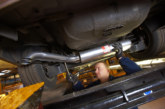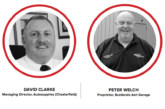
With access to data becoming an increasingly important topic in the aftermarket, our contributors discuss how businesses will have to adapt in order to survive.
David Clarke
Managing Director, Autosupplies (Chesterfield)
What we do know is that the increasing amount of data being produced by vehicles is going to change the way the automotive sector functions. Garages will still have the right to access the necessary information to repair vehicles – there will just be a lot more of it!If businesses don’t want to get left behind, they must invest in the necessary equipment, tools and training, particularly if they want to compete in the digital world.
What we’re already seeing – and what we’ll see more of – is garages being forced to specialise in certain marques to ensure they have the right level of knowledge, expertise and equipment to repair today’s vehicles.
All garages, whatever their size, have the infrastructure and support available to them, whether it’s through their suppliers, distributor/buying groups or trade associations, to not only survive in the future but be a significant force. They just need to take advantage of it.
Then there’s the rise of the connected car and move towards self-driving vehicles. Whilst autonomous cars are receiving a huge amount of press coverage, I believe they are still a long way off mass market appeal. Vehicle technology has developed at a rapid rate over the last couple of years, but the infrastructure required to support a network of autonomous vehicles is still quite a way off.
This doesn’t mean that areas of the aftermarket don’t need to continue to invest for the future: they do. This is currently very evident in traditional vehicles, yet newer technologies such as hybrids and EVs still tend to be in the domain of the franchised network. With the news that ‘pure’ diesel and petrol engine cars will be banned by 2040, the sector needs to start now to ensure that the relevant parts and technical information is available, so that new vehicle technologies can be repaired by the independent aftermarket.
PETER WELCH
Proprietor, Scotlands Ash Garage
The ongoing fight to ensure garages can access the OBD connector is a crucial one, as the outcome will change the face of the aftermarket.
It’s not just garages that will suffer either. This will be detrimental to the entire spare parts supply chain including manufacturers, distributors, producers of diagnostic equipment and dedicated software for the OBD connector. In terms of numbers, this accounts for more than 500,000 companies employing more than 4.3 million people in the independent aftermarket across Europe and offering services to 284 million vehicle owners and business operators alike. And let’s not forget the millions of consumers that this will also affect, as they’ll no longer have a competitive choice in vehicle servicing and repair.
With developments in technology and vehicle design showing no sign of slowing down, it is vital that test equipment can still be connected to a vehicle through diagnostic equipment.
The good news for the aftermarket is that provisions on the OBD connector have now been included in the proposed type approval legislation, meaning independent garages could continue to have access to the OBD connector. This is so the OBD is not entirely controlled by the VM through remote diagnostics.
It will also stop some VMs potentially utilising a legislative loophole and gaining a monopoly on access to technical vehicle data, controlling the cost of information and potentially shutting out independent workshops entirely.
Thanks to the IAAF and the other trade organisations fighting against the type approval proposals, we can only hope that aftermarket access to in-vehicle data remains possible. Under legislation, VMs would then have to continue to fit the OBD connector in new models of cars, meaning both consumer choice, and the future of the aftermarket, would remain protected.







